If your pet is experiencing a medical emergency or you need immediate assistance, please call us at (480) 405-0625. The Scottsdale Veterinary Clinic specializes in cat dentistry in Scottsdale, AZ, from cleanings to tooth extractions.
Annual Cleaning
$442
Recommended Package Includes:
Basic chemistry/CBC blood profile, pre-anesthetic evaluation, anesthesia, ultrasonic scaling, oral charting, dental probe, low speed polish, fluoride treatment, IV fluids, antibiotic injection, pain injection, advanced dental imaging.
Conscious Sedation
$195
If tooth extractions are required and anesthesia is induced: $320 additional (price does NOT include extraction or medication cost)
Includes: Sedation, ultrasonic scaling, oral charting, dental probe, low speed polish, fluoride treatment, SQ fluids, antibiotic injection, and dental x-rays.
*If your pet is over the age of 6 years or older, it is required that a blood profile be performed & an IV catheter be placed to deliver IV fluids. The additional charge is $95.
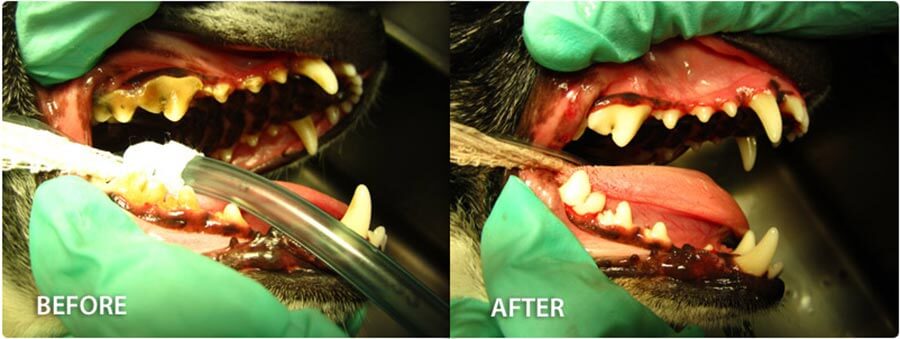
Pet Dental Cleanings
We recommend having your pet’s teeth cleaned before they require extractions. Performing dental cleanings while they have low grades of tartar and periodontal disease has many benefits. Benefits include: Lower cost to you, decreased stress to your pet and more options for the type of dental performed. An animal that has a Grade I periodontal disease has the option of undergoing a conscious sedation dental or a traditional dental. However, an animal with Grade III periodontal disease only has the option of a traditional dental with anesthesia.
During the examination, if your dog or cat is found to have severe dental disease, a Doctor will need to assess your pet and may need to prescribe antibiotics. If this is required, a Doctor’s examination fee ($120) will be applied, and the appointment may need to be rescheduled based on the Doctor’s availability.
Grades of Feline Tartar
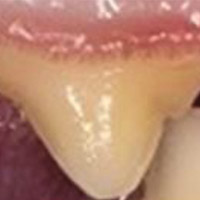
Grade I
Mild plaque present, no tartar
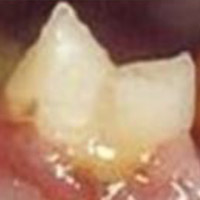
Grade II
Moderate plaque, tartar cover <50% of tooth
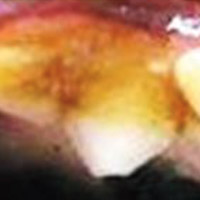
Grade III
Moderate tartar that covers 50–80% of tooth
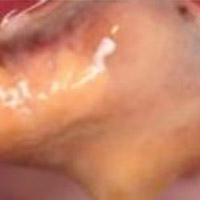
Grade IV
Severe tartar that covers 80–100% of tooth
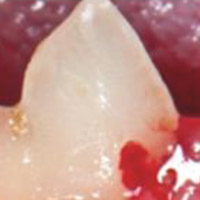
Resorptive Lesions
“Cat Cavities” – these lesions predispose the tooth to infection
Grades of Feline Periodontal Disease
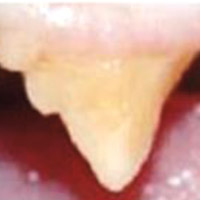
Grade 0
Normal, some plaque, no bone loss
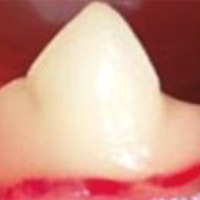
Grade I
Mild gingivitis/red line, no bone loss, reversible changes
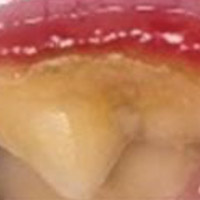
Grade II
Moderate gingivitis, <25% bone loss, swollen gums, odor noticeable
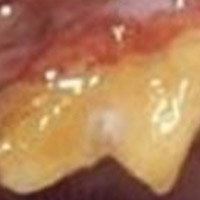
Grade III
Severe gingivitis >25% bone loss, gingival recession, sore mouth
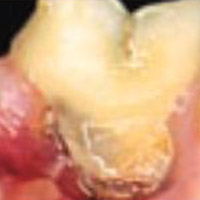
Grade IV
Severe gingivitis, >50% bone loss, severe recession, loose teeth
.jpg)
Cats are beloved companions who bring joy to our lives. However, many pet owners don’t understand the importance of maintaining their cat’s oral health. Just like humans, cats need to have their teeth brushed and undergo professional exams and cleanings. Poor dental care can lead to serious health problems, so it’s important to have a good understanding of what is involved in cat dental care. Here at The Scottsdale Veterinary Clinic in Scottsdale, AZ, we understand the importance of providing the highest quality and best service to pet owners. In this article, we’ll share what’s involved in cat dental care, how it impacts the overall health and well-being of cats, and how to care for your cat’s teeth at home between appointments. We will also look at the signs and symptoms of dental issues, how veterinarians diagnose dental problems in cats, and what conditions can occur as a result of poor cat dental care.
What Does Cat Dental Care Include?
Like humans, cats need regular dental care to maintain their oral health and prevent serious problems. This includes brushing their teeth at home and scheduling regular checkups with your veterinarian. Brushing your cat’s teeth reduces plaque and tartar buildup and lowers the risk of periodontal disease. We recommend brushing your cat’s teeth at least three times a week using a soft-bristled toothbrush and special cat toothpaste. You should also schedule regular checkups with your veterinarian to ensure that your cat’s teeth and gums are in good condition.
How Does Dental Health Impact My Cat’s Overall Health and Well-Being?
Dental health plays a crucial role in your cat’s overall happiness, health, and longevity. Poor dental hygiene can cause bacterial infections that may enter the bloodstream and damage vital organs such as the heart, liver, and kidneys. Dental issues can also lead to pain, loss of appetite and difficulty eating. For these reasons, staying on top of your feline friend’s dental health is crucial.
.jpg)
What Types of Dental Care Should I Be Giving My Cat at Home?
At home, you should incorporate regular brushing and dental diets and treats into your cat’s routine. Brushing your cat’s teeth is the gold standard for at-home cat oral care and helps prevent the plaque and tartar buildup that can lead to gum disease. Feeding your cat a diet specifically designed for dental health can also help keep their teeth clean and strong. Dental treats and chews are also great for removing plaque and tartar, but they aren’t a substitute for brushing. Always choose treats or chews that suit your cat’s size and dietary needs.
What Are Some Signs and Symptoms of Oral Health Issues in My Cat?
It is important to be aware of the signs and symptoms of dental issues in cats so you can seek prompt treatment. Some common symptoms include bad breath, difficulty eating or chewing, dropping food and hissing, drooling or excessive saliva (with or without blood), pawing at the mouth, head shaking or jaw chattering, red, swollen, or bleeding gums, visible tartar or plaque, broken or loose teeth, excessive yawning, and more. If you notice any of these signs in your cat, schedule an appointment with your veterinarian as soon as possible.
How Do Veterinarians Diagnose Dental Problems in Cats?
Veterinarians diagnose dental problems in cats with oral examinations and dental X-rays. During a comprehensive dental examination, your veterinarian will perform a thorough examination of your cat’s mouth, teeth, and gums. They may also carefully probe lesions or areas of concern to assess the extent of the problem. Dental X-rays are also essential for identifying issues hidden below the gum line, such as tooth resorption or bone loss due to periodontitis. Cats usually need to be under general anesthesia or heavy sedation for oral exams and dental X-rays. This ensures that the veterinarian can thoroughly examine and diagnose dental issues without causing pain or discomfort.
What Are Some Possible Conditions Caused by Poor Cat Dental Care, and What Are the Treatments?
Poor cat dental care can lead to a variety of conditions, including gingivitis, periodontitis, and tooth resorption. Gingivitis is an inflammation of the gums around the teeth, causing redness, swelling, and pain. It is usually caused by plaque buildup. Periodontitis is disease of the tissues surrounding the teeth including the bone and ligaments that attach the tooth to the bone. It can cause tooth loss if left untreated. Tooth resorption is a condition in which a cat’s teeth are gradually broken down and absorbed by the body. Treatment for all three conditions includes regular dental cleanings, home care such as brushing and special diets, and professional dental treatment from a veterinarian.
.jpg)
Why Choose The Scottsdale Veterinary Clinic for Cat Dental Care?
The Scottsdale Veterinary Clinic is an excellent choice for cat dental care because we understand the importance of maintaining your cat's oral health and are committed to providing exceptional services. Here at The Scottsdale Veterinary Clinic, we emphasize prevention to avoid potentially painful and life-threatening oral health issues. We offer a comprehensive range of dental care services, including dental exams, X-rays, and cleanings using state-of-the-art equipment. We also work with pet owners to create customized dental care plans tailored to each cat's unique needs. Our team of experts has the knowledge and experience needed to address the unique needs of cats’ oral health.
Prioritizing your cat's dental care is essential to their overall health and well-being. Choosing our animal hospital for your cat's dental care ensures that your feline friend receives professional, comprehensive, and compassionate care from a team that understands the importance of maintaining good oral health in cats.
Conclusion
Good oral health is essential for cats to live long, happy lives. Pet owners should be aware of the signs and symptoms of dental issues in cats, know how to properly care for their cat’s teeth at home, and schedule regular checkups. Poor dental care can lead to serious health problems, so it’s important to have a good understanding of what is involved in cat dental care.
At The Scottsdale Veterinary Clinic, your pet is our priority. If you have any questions, don't hesitate to call our team at (480) 405-0625, or you can email us at [email protected]. Our staff would love to talk with you!
Don't forget to follow us on social media: Facebook, Instagram.
